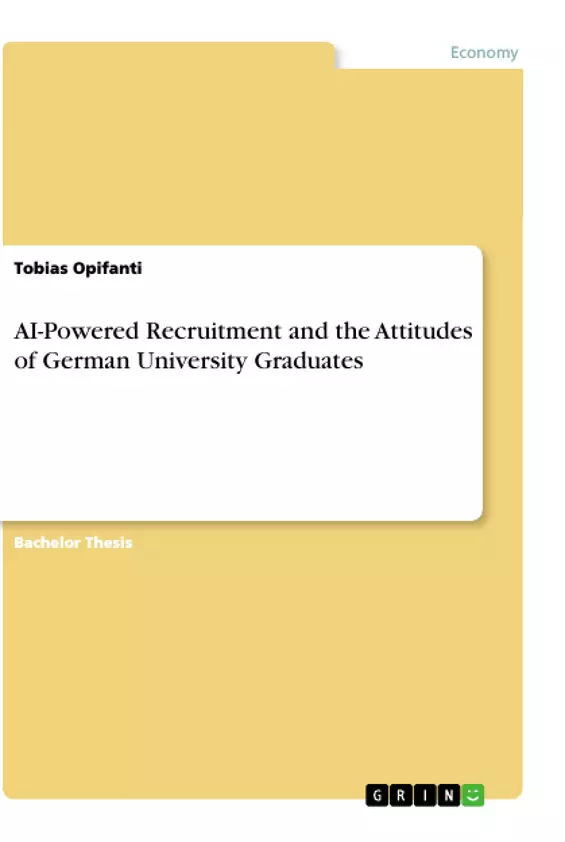The purpose of this thesis is to investigate German graduate students' attitudes towards AI-powered recruitment. Toward this end, data were collected through a questionnaire that was e-mailed to German university (graduate) students. Businesses are becoming increasingly reliant on technology as globalization progresses. New skills and knowledge are vital for organizations to be competitive, making Human Resource Management (HRM) more important now than ever.
The application of advanced technology like Artificial Intelligence (AI) has gained significant attention in the recruitment process in recent years. AI offers promising solutions for recruiters to increase cost and efficiency by taking over repetitive tasks, such as screening CVs and conducting job interviews. However, little is known so far about how these solutions affect potential applicants' attitudes, particularly the attitudes of graduate students from German universities, and whether they are willing to accept and make use of the new opportunities offered by AI.
The online questionnaire gathered data from a total of 456 different respondents. However, 50 respondents dropped out before completion and a further 36 respondents were not in line with the inclusion criteria. These respondents needed to be excluded from the sample, which resulted in a final sample size of n=370 individuals.
Inhaltsverzeichnis (Table of Contents)
- Introduction
- Literature review
- Recruitment Process
- AI-Powered Recruitment
- Candidate Reactions towards AI-Powered Recruitment
- Methodology
- Data analysis
- Conclusion
Zielsetzung und Themenschwerpunkte (Objectives and Key Themes)
The thesis aims to investigate German graduate students' attitudes towards AI-powered recruitment. The study explores the impact of AI on the recruitment process and the factors influencing candidate reactions to this technology. It specifically focuses on the attitudes of German university graduates, assessing their willingness to engage with AI-driven recruitment practices.
- The role of AI in the recruitment process
- Factors influencing candidate attitudes towards AI-powered recruitment
- The impact of AI on the recruitment process from the perspective of German university graduates
- The influence of impartiality, feedback, and technology acceptance on candidate attitudes
- The significance of AI technology type on candidate acceptance
Zusammenfassung der Kapitel (Chapter Summaries)
- Introduction: The chapter provides an overview of the research topic and highlights the growing importance of AI in the recruitment process. It outlines the research objectives and the rationale for investigating German graduate students' attitudes towards AI-powered recruitment.
- Literature review: This chapter reviews existing research on the recruitment process, AI-powered recruitment, and candidate reactions to AI in recruitment. It examines previous studies and theoretical frameworks to provide a foundation for the research.
- Methodology: The chapter describes the research methodology employed in the study. It outlines the research design, the data collection methods, the sample, and the data analysis techniques used to investigate the research questions.
- Data analysis: This chapter presents the results of the data analysis. It examines the descriptive statistics, reliability analysis, and the key findings related to the relationship between AI-powered recruitment and candidate attitudes.
Schlüsselwörter (Keywords)
The main keywords and focus topics of the text include recruitment process, AI-powered recruitment, candidate reactions to AI-powered recruitment, technology acceptance, impartiality, feedback, and German university graduates. The research centers on understanding the role of AI in the recruitment process, particularly the attitudes of German graduate students towards AI-driven recruitment practices.
Frequently Asked Questions
What is AI-powered recruitment?
AI-powered recruitment uses artificial intelligence to automate repetitive tasks like screening CVs, sourcing candidates, and even conducting initial job interviews.
How do German graduates feel about AI in the hiring process?
The study investigates graduates' attitudes, focusing on their willingness to accept AI and how factors like perceived impartiality and feedback influence their reactions.
Does AI make recruitment more impartial?
One potential benefit of AI is the reduction of human bias; however, candidate acceptance depends on whether they perceive the AI's decision-making as fair and objective.
What are the benefits for companies using AI in HRM?
AI helps Human Resource Management (HRM) increase efficiency, reduce costs, and allow recruiters to focus on more strategic and interpersonal aspects of hiring.
How was the data for this research collected?
Data was gathered through an online questionnaire sent to university students in Germany, resulting in a final sample size of 370 individuals.
- Citation du texte
- Tobias Opifanti (Auteur), 2020, AI-Powered Recruitment and the Attitudes of German University Graduates, Munich, GRIN Verlag, https://www.grin.com/document/915639



